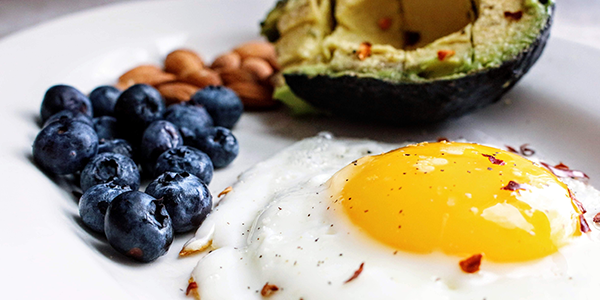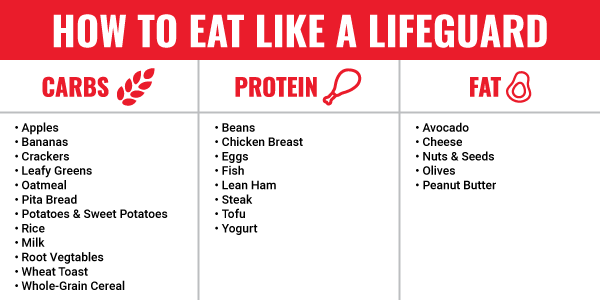Nutrition & Hydration 101 for Lifeguards

Wouldn’t it be great if you could eat anything you want, whenever you want? OK, maybe some of you do that already, but your metabolism has a shelf life. And when it goes, the harder it is for your body to make the most out of the foods you eat.
Being a lifeguard means you probably already have a healthy respect for physical fitness, but so many of us forget — or scoff at — nutrition’s role in keeping us primed to perform our duties.
Calorie counting doesn’t go far enough, because not all calories are created equal. To complicate things more, maybe you are eating all the right foods, but are still having difficulty keeping your energy levels up during a shift or training session. And how much water should you be drinking, anyway?
Think about it this way: If pool goers could see what you had for breakfast, would you be proud? Would you feel like, as a lifeguard, you did everything you could? Even if you said, “Yes,” there’s always some room for improvement.
We’re here to demystify diet so you can get back to guarding at your body’s fullest potential. If you find your nutritional knowledge is lacking, then read on.
Nutrition for Lifeguards, Explained
Contrary to what many amateur nutritionists claim, “carb” isn’t a four-letter word, especially for endurance athletes like swimmers, and pretty much for swimmers in general. Carbohydrates help produce a lot of glycogen, which is basically the perfect body-battery during exercise. Glycogen is stored all around your body, including your muscle, blood, and liver. It’s also produced from that pre-workout bowl of pasta or rice. Here’s a few situations where carbohydrates are practically essential. See if you can recognize any of them:
- You’re powering through an exhausting swim and save training session
- It’s an early shift at the pool, you’re still waking up, and it’s really hot out
- You’ve got a big evening pool party to supervise, and you haven’t had anything but an energy bar since lunchtime
- You need to perform a submerged rescue in deep water
We’ve talked before about how swimming is a major workout, consuming more calories on average than running or biking. Carbs are the most efficient way to fight fatigue and prepare your body for swim and rescue training.
But pasta doesn’t do the job alone. The right combination of saturated and unsaturated fats are needed for extra energy stores, and lean proteins are still very important building blocks for repairing and regenerating muscle tissue. Post-workout protein is especially important to boost how much glycogen your body can store.
How to Eat Like a Lifeguard
Keep in mind that every swimmer is different and should adjust to their dietary needs and restrictions. But a good rule of thumb is 50/25/25:
- 50% carbs
- 25% protein
- 25% fat
Aim to consume enough calories to get through an active day in-season, but not so much at once that you’re going to feel sluggish on the stand! This can vary from person to person and weight to weight.
There’s probably no need to get lost in the simple vs. complex discussion of carbs. Try not to overthink your grub; just consider the quality. Take a look at some of our suggestions below. You might see fewer fat resources, but you’ll get plenty of healthy fats from the other carb and protein sources listed here.

How Much Water Should I Drink, Anyway?
It’s a lot easier to remember to hydrate when you’re on the stand, but not as much when you’re a few laps into your swimming workout. A general rule is about eight glasses of water a day, but it varies from person to person and how long you’re in the heat.
Sports drinks are OK in moderation. They contain easily digestible carbs and replenish the sodium and potassium that you lose in your sweat, but they also contain a lot of added sugar. Most people have enough sodium in their diet already, and bananas and coconut water are great at replenishing potassium.
—
Some people say, “You are what you eat,” and that definitely applies to good lifeguards. It takes just a little bit of practice to plan and prepare well-balanced meals. But once you get the hang of it it’s super simple, healthy, and enjoyable, too!
